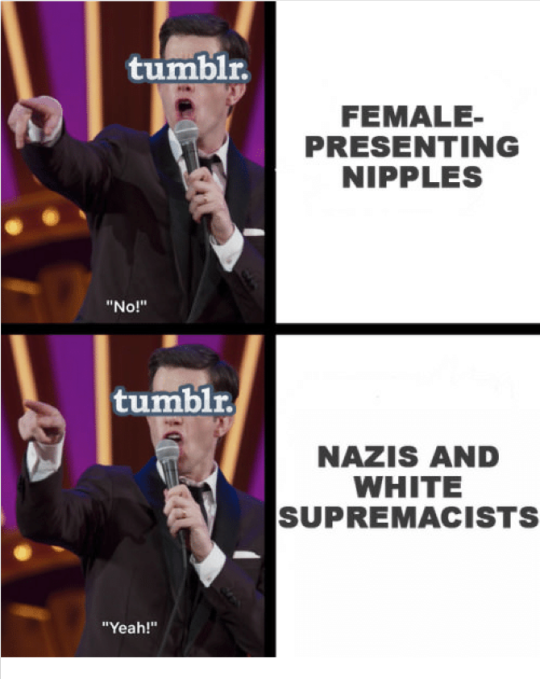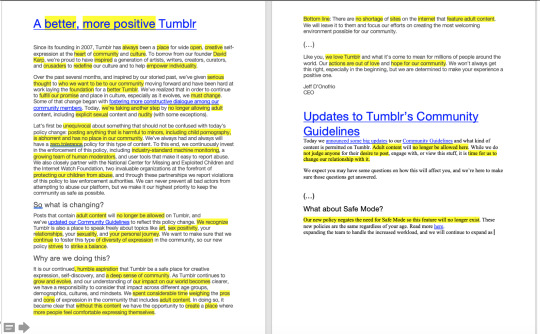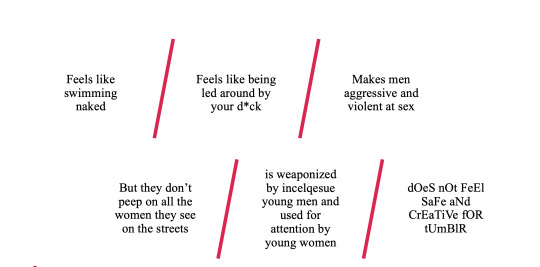#AoIR2019
Text
My speculative-fiction-based provocation for the AoIR 2019 “fuck the system” roundtable
I did a talk in a panel re: the Tumblr NSFW ban (which I’ll post later) and participated in this roundtable at my most beloved conference - AoIR2019 this year. Both were fun and led to amazing conversations, but “Fuck the System” was particularly awesome, because it was incredibly well attended, and included so many interesting comments and contributions not just from the speakers, but also from the audience (the pic is about half of the room doing their version of ‘fuck the system’).

My amazing colleague and co-author Emily van der Nagel created a great twitter thread from the round table, which the Thread Reader App unrolled for everyone’s reading pleasure.
Anyway, here is my provocation.
Like many of us, I was very frustrated with Tumblr’s choices in December of 2018. So I thought that it might be worth engaging in some speculative fiction thinking on what social media would be like if it did not try to deplatform sex every time someone pointed out a platform has a nazi problem. Because it really seems kind of Pavlovian by now – we say: “hey, uh … you have these people advocating for hatred or genocide.” And they say: “titties, titties, omg I saw nipples, THINK OF THE CHILDREN!” It’s kind of the inverse of that old movie Wag the Dog. Instead of faking a war to cover up a sex scandal, social media platforms seem to be faking a sex scandal every time they need to cover up how their platforms are used for disseminating hate.

Speculative fiction builds on approaches like socio literary techniques, speculative design, design fiction, creative prototyping, speculative science fictions etc. (i.e. Future oriented methods of Donna Haraway and Bruno Latour.
Speculative science fiction (Annette Markham and Kseniia Kalugina, 2017)
Design fiction and creative prototyping techniques (Burnam Fink 2015)
‘socio-literary techniques’ (Bennett & Clark Miller, 2008)). These are methods for harnessing socio-literary imagination, and they sometimes work with prompts developed from existing knowledge and literature. I too came up with prompts:
First I asked some of my Facebook friends to fill out a Facebook profile for someone who would post sexually explicit content on Facebook
Second, I asked some of my friends, who are at least hobby level creative writers, to imagine that all sexual content has been banned everywhere on the internet for 10 years, and then to write me a short vignette from the perspective of a content moderation AI, a sexdoll, a priest, etc, there was a whole list
Based on this, I want to briefly go through the imaginaries about Facebook with sex, the whole internet without sex, and Tumblr with and without sex, and see where we end up, provocation wise.

Let’s start with the Facebook profiles. It seemed that people thought that it would be either:
young, kind of ditsy, not very career-oriented women, who are into nightlife, witchcraft, Charli XCX and 24-hour champagne diet”
completely nondescript successful men
or these incel-y young men, who have 73 Reddit profiles and post 4 different kinds of anti feminist quotes who would post sexual content on Facebook.
That was very brief, but let’s move to the narratives.
I had a story from the POV of a priest, a 50 year old woman, a 50 year old man, and a sex doll in a post internet sex ban world. Here’s what I picked out from these:
The priest story communicated...
... certain relief to be able to live in the world where a celebrity boob selfie is not going to commandeer attention.
... worry that life without flirting on Facebook would be sad - and the presumption that not being able to post sexual content on the internet also means no flirting is interesting here
... Finally, this story ended with a question: “But is a cat sad to be castrated?” – which tells us that an internet with no sexual content equals castration.
The 50 year old woman POV story painted a very evocative picture of going in circles and how rhetorical leaps are made by those governing our internet. I think my favorite part of this story was how the author linked declaring young women’s exposed bodies on social media explicit content with the feeling she had when she was “young, and full of uncomfortableness with your own body” until she gathered up her guts to take off her bikini and swim naked and laugh
The 50 year old man POV story, I think, was perhaps the most surprising for me. In it the protagonist tells a story of how he remembers masturbating furiously all night before the ban went into effect, and how hard it was for him to get off or get or keep an erection for months after the ban. But then spring came, women wore yoga pants, so all he needed to do now was to sit on his window, stare and masturbate. During summers he went to the beach, and during winters he just had to recollect a mental image from the summer. So basically the porn ban made him a raging peeping tom.
Finally the sex doll POV story told a tale of a male owner, who used scream at her and pull her hair, but since the ban of sexual content on the internet, he has been getting calmer and gentler. Just rubbing his finger over her nipples makes him sigh happily. He has named the doll Helena and likes sleeping with it. “I think he loves me” the story ends.

Ok, so let’s now look at Tumblr CEOs blog post about the NSFW ban. He says, multiple times, that they have thought really super very hard about it and Tumblr with sex is:
not positive
does not have deep sense of community
does not feel like a safe space for creative expression and self-discovery
and makes it impossible for Tumblr to fulfill their “promise and place in the culture”, to “grow” and “evolve”, to “have an impact on the world”, and to create a place where more people want to express themselves.
It is unclear what these big promises are that Tumblr feels it has made to “the culture” or what impact it is planning to have on the world.
The updated community guidelines, however, assure us, that throwing sex out of the window “negates the need for Safe Mode.” When there was porn you could at least opt out of seeing it, but everyone must see the hateful content that remains on the platform.

So putting all of this together, and trying to imagine social media WITH sex, we get this bizarre, but not entirely useless picture, which I hope can be used to start more conversations or ask consequent research questions.
Sex on social media, according to this speculative fiction exercise, is:
like being able to swim naked and laugh
like being led around by your dick - uncomfortable, but you’d rather keep it than be castrated
keeps men from stalking and peeping on women on the streets
but also trains men to be really aggressive and rough at sex
allows young women to get attention, and they like it
men just like it
young incel men weaponize it
but it makes tumblr feel really unsafe and doesn’t allow it to fulfill their huge promise towards the future of Culture.
#AoIR2019#speculative fiction#socio literary methods#speculative methods#roundtable#deplatforming of sex
0 notes
Text
call for papers Association of Internet Researchers
Association of Internet Researchers (AoIR)
2019 Annual Meeting
Theme: Trust in the System
2-5 October 2019
Brisbane, Australia
15 January 2019: Submission site opens for #AoIR2019 Brisbane
1 March 2019: Submissions due
Trust is one of the most critical issues of our time: trust in our fellow Internet users; trust in the information we encounter in our online environments; trust in the data we produce and in the data that are continuously produced about us; trust in the algorithms that process and evaluate these data; trust in those who create the digital content we consume; trust in platforms and intermediaries that maintain our online spaces and that manage and trade in these data; trust in our national and regional governments that engage citizens over the Internet; trust in grassroots, social welfare and non-government organisations; trust in the regulatory bodies and political systems that are in charge of governing these systems of exchange. At every level, and spurred on by a rise in extremism and increased suspicion of others, our trust in the system is being challenged, presenting challenges for existing institutions and the opportunity to imagine new ones. The 2019 conference of the Association of Internet Researchers addresses these questions of trust.
Trust is one of the techno-emotions that shape sociality online (Svedmark, 2016), and is part of the process that guides the choices we make on the Internet (deLaat, 2008). Consequently, the data about us and our interactions that are produced and processed across a variety of digital devices encapsulate deeply personal and intimate facets of our digital selves. For the most part, these data are managed by commercial third-party platforms and applications, where many users have proven unable to exercise appropriate control of their data. While governments and other regulatory bodies seek to find appropriate settings for governance of a transnational, datafied society, trust in the government is an option only for the privileged, and undermined by the rise of populist and partisan regimes. At the same time, developers and activists have proposed and introduced a number of alternative, supposedly more trustworthy systems of their own, from Tor to Blockchain and beyond, but these, too, frequently embed only the limited worldviews of their creators. But ‘we’ are many, diverse, complicated, and contradictory, and in Internet research as much as in its development, governance, and use it is crucial that the voices of the marginalised finally be heard.
As Internet researchers at the intersection of critical studies of technology, culture, and society, the present crisis of trust in the system presents us with opportunities to seek new insights into these issues and provide advice and guidance for individuals, communities, governing bodies, policy-makers, and platform providers. While emergent technologies attempt to bridge the gap between users, developers, and processes, there is still significant work to be undertaken on critical issues such as rebuilding trust for Internet users. The 2019 AoIR conference in Brisbane, Australia, invites contributions that explore the question of whether we can still have, or how we might regain, trust in the system: in a world of unscrupulous actors and dubious data, how can we know what and whom to trust? Indeed, how might we change the system itself – rethinking, redesigning, rebuilding, repurposing it – to provide a more trustworthy experience for a broader, more diverse, more inclusive community of Internet users?
The 2019 Association of Internet Researchers conference welcomes contributions that address these themes, including but not limited to the following questions:
Trust in technologies and platforms: how might users operate safely on commercially owned platforms? What role do emergent, decentralised, autonomous technologies play?
Trust after Cambridge Analytica: what is the impact of this highly mediatised data breach? Do users understand the data trails of their actions on the Internet?
Interpersonal trust: can we trust our friends on the Internet? Does authenticity become a central element of trust online?
Trust in governance: if national governments lack leverage over transnational tech giants, who do citizens trust to act in their interest? How do powerful actors in Internet governance justify their influence, and how can they be held to account?
Trust in information: as mis- and disinformation spread, how do we identify trustworthy sources of information?
Trust by design: how can design and development processes be reshaped to ensure greater inclusion of diverse and marginalised communities?
Trust in theory: what theories of trust are available to describe the present moment and provide pointers to possible futures?
Trust in black boxes: how can scholars, civil society, regulators, and users interrogate the workings of only partially visible communication systems? What ethical, methodological, and practical challenges must they confront in doing so?
Trust in translation: how do issues of trust play out in different national and cultural contexts? How might we de-westernise current debates about trust by recognising different international perspectives, especially perhaps from the Asia-Pacific region?
Distrust in the system: how might trust’s darker side be addressed? What are the alternatives to trust?
6 notes
·
View notes